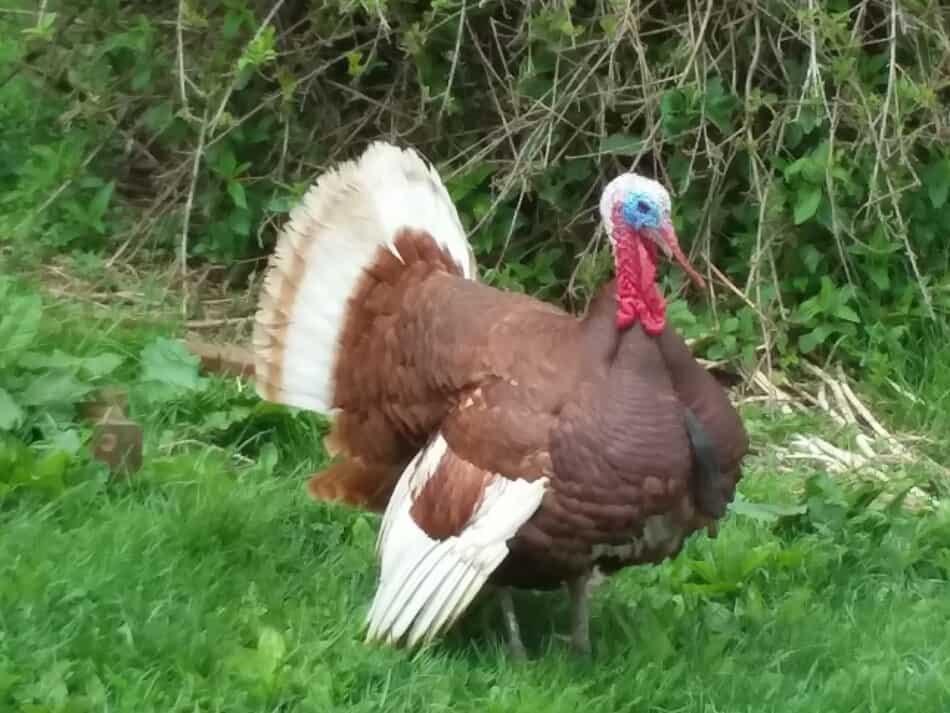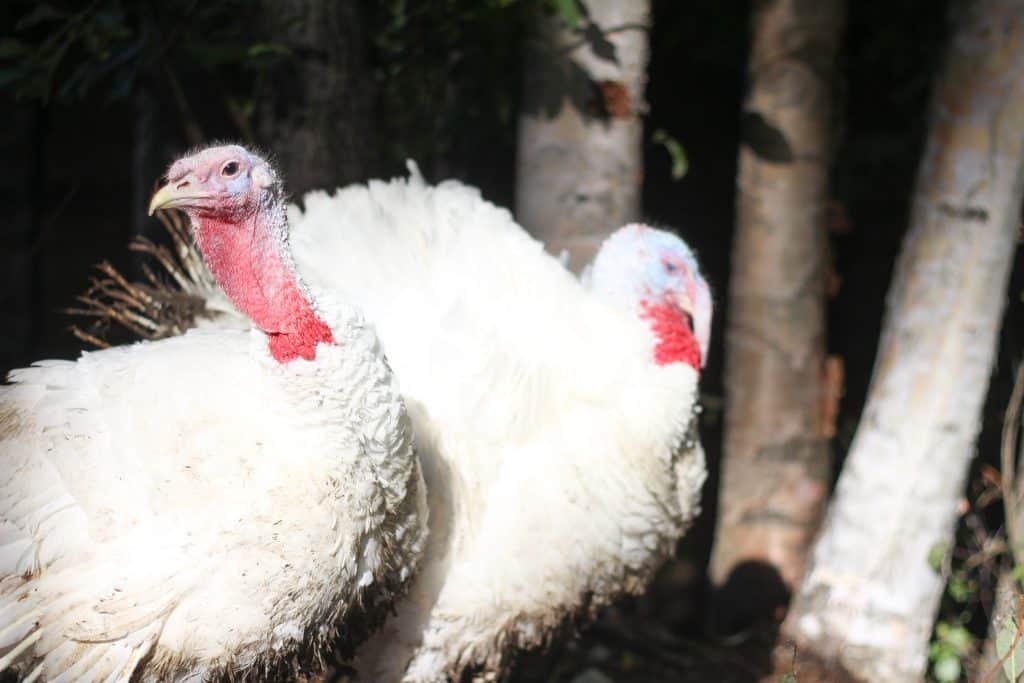With Thanksgiving approaching, our family will be getting ready to enjoy a truly homegrown feast. Raising turkeys for meat is a rewarding experience and everyone can be involved.
Several years ago, our good friends helped us get started with raising turkeys for meat. The girls picked out four little poults (baby turkeys) and brought them home. We have since raised a few turkeys every summer.
We typically have eight turkeys. Our daughters participate in 4-H and raise turkeys for the state fair so that leaves five or six for us. We plan to have one on Thanksgiving, one on Christmas, and the rest for smaller cuts of meat to eat throughout the year.
Raising turkeys isn’t that difficult and can be an enjoyable experience. This is how we do it here in Alaska every summer.
Butchering a turkey at the right age is crucial to getting the best quality meat There are a few factors to consider when deciding when to butcher your turkey
Broad Breasted vs Heritage Breeds
The two main types of turkeys are broad breasted and heritage breeds. Broad breasted turkeys are the most common commercial breeds. They grow very fast and produce a large amount of breast meat. Heritage breeds grow slower and have more flavorful meat.
Broad breasted turkeys are typically butchered between 16-20 weeks of age. Toms will weigh 25-36 pounds at this age and hens 18-24 pounds. The carcass weight will be around 80% of the live weight.
Heritage breeds take 24-28 weeks to reach butchering size Their mature weight is lower, around 16-30 pounds for toms and 10-18 pounds for hens The carcass weight is around 75% of the live weight.
Target Carcass Weight
The target carcass weight depends on the size of turkey you want for your meal For a holiday turkey, aim for a carcass weight of around 20 pounds.
For broad breasted turkeys, an 18 week old tom will yield around a 20 pound carcass. Hens need to grow a bit bigger to reach that size, around 19-20 weeks.
Heritage toms need about 24 weeks to produce a 20 pound carcass. Hens often don’t reach that size, with carcasses around 13-15 pounds at 24 weeks.
Timing for Holidays
If you want a fresh turkey for Thanksgiving or Christmas, you need to time your poults accordingly.
For broad breasted turkeys, get poults in mid-July. This will produce a 16-20 week old turkey in late November.
Heritage poults should be acquired in late April to early May for a 24-28 week old turkey for the holidays.
Feed Withdrawal
It is best practice to withdraw feed 8-12 hours before butchering. This empties the crops and intestines for cleaner processing.
Pen up the turkeys the night before butchering so they can’t eat. If you are unable to withdraw feed don’t worry, just butcher early in the morning before they’ve eaten much.
Pros and Cons of Earlier Butchering
Butchering a bit earlier, around 16 weeks for broad breasted turkeys, produces a smaller turkey. However, it requires less feed.
The meat may be slightly less tender than waiting those extra couple weeks. But the difference is small, so butchering earlier is an acceptable option.
Signs of Readiness
How do you know your turkey is ready to butcher?
For broad breasted turkeys, butcher at 16-20 weeks of age based on the target carcass weight.
Heritage breeds take longer to mature. Look for signs like:
- Full feather development
- Meaty thigh and drumstick area
- Loss of pinfeathers
- Bright red wattles and snood
- Toms attempting to strut and mate
The heritage breeds do vary in their development times. Monitor your flock and butcher once birds reach ideal market weight for the breed.
Proper Butchering Technique
Butchering your own turkeys takes skill. Make sure to use proper technique for clean processing and quality meat.
- Use very sharp knives and keep them sanitized
- Chill the carcass as soon as possible, within 2 hours ideally
- Follow USDA guidelines for poultry slaughter
- Pluck immediately after killing while the skin is still warm
- Remove innards carefully without puncturing intestines
- Rinse thoroughly with cold water
With the right timing and butchering practice, your homegrown turkeys will provide amazing holiday meals for your family. Do your research and enjoy the rewarding experience of raising your own turkeys.

Challenges When Raising Turkeys for Meat
- They can pass easily-Unfortunately, turkeys are known to not always thrive. We were warned about this so we started with four turkeys just in case we lost one. Well, only one ended up making it to butchering! We lost one as a chick, which happens sometimes with all poultry. Another got out of our fence (I don’t recommend chicken wire for turkeys!) and was taken by a fox during the night. Then we found one shortly before butchering that had passed in its sleep. So we only ended up having one turkey for meat that year. Now every year we get extra turkeys just in case and wouldn’t you know, we haven’t lost one since!
- It’s expensive-If you’re looking to save money by raising your own turkeys for meat, you won’t. Buying a turkey from the grocery store is much cheaper. It costs about $100 a turkey from start to finish where we live here in Alaska. The cost may vary depending on where you live and what feed you have access to.

Reasons to Raise Turkeys for Meat
We have several reasons why we continue to raise turkeys every year.
- Know where your meat is coming from-This is a great reason to raise any type of food yourself. You know exactly where it came from, how it lived, what it ate, as well as how it was processed. If you aren’t able to raise your own turkeys (or any meat for that matter) buying it from a local farmer is always the next best option.
- It’s rewarding-Taking the time to raise an animal that will feed your family gives you more appreciation for your food than if you had no hand in it at all. Sitting down to a meal that your family worked hard to put on the table together makes it all the more special.
- Great experience for kids-Our girls take great care of our turkeys. They feed, water, clean, and walk the turkeys around daily. Keeping track of weight gain and overall health is a learning experience as well. They also do much of the butchering process. Caring for an animal and helping to provide food for your family is one of the best learning and growing experiences for kids.
Butchering Turkeys: Easy Set Up/Easy Clean Up
FAQ
At what age do you butcher a turkey?
Can you eat older turkeys?
What age can you eat turkey?
How long does it take for a turkey to mature for slaughter?
What is the ideal age for butchering a Turkey?
The ideal age for butchering a turkey depends on several factors, including the breed, sex, and desired meat quality. Here’s a breakdown of the key considerations: Breed: Broad-breasted turkeys, the most common type raised for meat, are typically ready for butchering between 18 and 20 weeks of age.
When should you butcher a Turkey?
However, if you prefer a more flavorful and mature taste, waiting until the turkey is closer to 20 weeks or older is ideal. Additional Factors: Body Weight: A good rule of thumb is to butcher your turkey when it reaches a live weight of 16-20 lbs for hens and 24-30 lbs for toms.
What age should a Turkey be slaughtered?
What is the best age to slaughter a turkey? Hens are considered ready for slaughter at 14 to 16 weeks old, and male turkeys at around 19 weeks old. Some intensively farmed turkeys are slaughtered as young as 12 weeks old.
Do you need to chill a Turkey before butchering?
Butchering a turkey is a tiring process, so you and your turkey both need to chill for some moment. Because you need rest for gaining the stamina for cooking delicious meat and the turkey that is ready to get butchered needs to cool-off as it helps to stop germs’ growth and keeps the meat and skin together.
